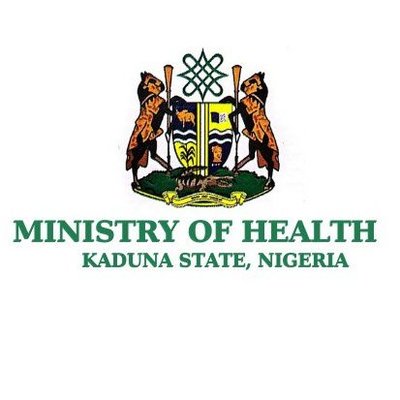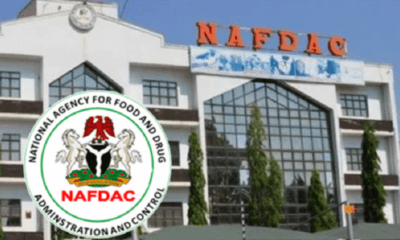Health
Drug export: Agents pledge to support NAFDAC through unified exportation procedure
In its quest to finding lasting solutions to the problem of Nigeria non-oil export rejects abroad, the National Agency for Food and Drug Administration and Control (NAFDAC) has once again extended hands of collaboration to critical stakeholders in the nation’s ports with a view to working together to revamp the export trade in the non-oil sector and reduce the rejection of Nigerian products thereby positioning the country in a better state in the Global market.
The Director General, NAFDAC, Prof Mojisola Adeyeye who was ably represented by Dr Abimbola Adegboye, the Director, Port Inspection Directorate (PID), who also heads the Office of Trade and International Relations (OTIR), at a consultative meeting with Pre-shipment Inspection Agents on Friday, expressed the Agency’s discomfort with the alarming rate of rejections of food exports from Nigeria.
She pointed out that the meeting was aimed at building effective collaboration with NAFDAC to complement its robust regulatory policies geared toward understanding the NAFDAC export processes, collaboration to safeguard a unified exportation procedure and zero rejects of Nigeria export products.
She expressed dismay that a competent authority on food safety matter with all her acclaimed global accreditation in food safety testing could be totally blanked out in the listed requirements for issuance of Clean Certificate of Inspection (CCI) by the Pre-shipment Inspection Agents. No wonder there are high volumes of reject from Nigeria as the NAFDAC regulated products were not tested nor production processes validated for compliance before export.
Present at the meeting were the top management staff of Neroli Technologies Limited, the agent covering South-south and South-west zone; Anglia International Services Limited, the agent covering North-West and North-Central zone and Gojopal Nigeria Limited, the PIA covering North-East and South-East zone. They all made commitments to immediate rectification of this lapse on their website and their process and enlightening their client to use the Nigeria Single Window for Trade portal (www.swt.gov.ng)to procure their exports certification.
NAFDAC as a Governmental Agency was established by Enabling Act Cap N1 Laws of the Federation of Nigeria (LFN) 2004 which empowers the Agency as the competent authority in Nigeria and charged with the responsibility of regulating and controlling the quality of manufactured, importation, exportation, distribution, advertisement, sale, and consumption of food, drug, chemicals, and other regulated products. Essentially, the NAFDAC mandate is to ensure traded products are of good quality, safe and wholesome.
The Port Inspection Directorate of the Agency has met with the Chairman of Comprehensive Import Supervision Scheme (CISS) and Nigeria Export Supervision Scheme NESS, Area Comptroller of Nigeria Customs Services at the Ports, advocacy visits were made to export sheds at seaports, airports, and land boarders.
She however, expressed her appreciation of the activities of PIAs as a main actor in the processes chain of exportation adding that coming together of the critical stakeholders will help make the trade of non-oil sector to be better, more robust and more consultative.
“NAFDACs door is opened to enhance export and trade, we encourage and support trade of quality products,” she said, adding that “we are enjoining the PIAs to be part of the game and to make sure we collaborate effectively.”
The NAFDAC boss noted that the Agency acknowledges the importance of having broader and deeper Interactions and collaborations with sister agencies such as Standards Organization of Nigeria (SON), Nigeria Agricultural Quarantine Service (NAQS), Nigeria Export Promotion Council (NEPC), Nigeria Custom Service (NCS) etc.
Prof Adeyeye emphasised the position of export as a major aspect of building every country’s economy because of its importance in international trade and economic stability, therefore the reason for regulation of the sector is to ensure that products that leave a country’s shores are of good quality, safe and meet international best practices among others.
For Nigeria, she said trade is critical to the national economic makeup, adding that in 2021, Nigeria exported $57.7 billion of goods, making it the world’s 52nd most exporting country.
Prof. Adeyeye disclosed that Cocoa beans, sesame seeds, cashew and seven other products top the list of agricultural commodities Nigeria exported within the first nine (9) months of 2022, generating N427.6 billion or $1.02billion.
The DG reiterated that huge volume of Nigeria’s exported agricultural commodities were often rejected by the European Union for not meeting required standards, adding that EU countries seized about 82 per cent of Nigeria’s agricultural products exported illegally.
According to her, these products are non-documented items and people move them out without clearance by the relevant regulatory agency.
The DG NAFDAC listed the following as reasons for export rejects: Technical Barrier issues e.g., defective packaging and inadequate labelling. Non-Documentation, Unauthorised transition, Illegal importation, Non-compliance to destination markets’ standards, the EU will reject consignments containing food that do not comply with EU maximum residue limits (MRLs) for Vet Medicine and Pesticides, and maximum limits (MLs) for Contaminants in foods.
Others include exporters’ boycott of relevant regulatory Agency e.g., NAFDAC, in the process of exportation, which leads to rejects, private huge losses and absence of government-to-government communications.
Prof. Adeyeye however maintained that tightening the regulatory and inspection regime for exports of food items and agricultural products is one of the ways to address export rejections, adding that all relevant Government Agencies and associations involved in Nigerian exports should ensure agro products exported are safe, of good quality and meet the specified International Standards.
“When all other relevant efforts are merged, we can achieve the reduction of reject on Nigerian export food commodities and increase foreign exchange earnings,” she said.
Health
FG bans use of foreign syringes, needles in tertiary hospitals


The Federal Government has mandated all Chief Medical Directors (CMDs) and Medical Directors (MDs) of Federal Tertiary Hospitals to procure needles and syringes solely from NAFDAC-approved local manufacturers.
The new directive is contained in a circular addressed to all CMDs and MDs signed by the Minister of State for Health, Dr Tunji Alausa, on Friday.
The minister said that the directive was aimed at boosting domestic production and shielding the country’s manufacturing sector from the influx of foreign goods.
The circular also mandated NAFDAC to stop issuing licences for the importation of foreign manufactured needles and syringes.
Alausa said the health sector had dentified local pharmaceutical industries that produce needles and syringes that were in serious trouble because of the practice.
He also said that out of the nine local pharmaceutical companies that produced needles and syringes eight years ago, six have folded up due to the dumping of largely substandard goods into the market.
“Mr President has directed that this must stop. We all agreed to take the necessary steps to immediately remedy this sad situation.
“Pursuant to this, NAFDAC has been mandated to stop issuing licences for the importation of foreign manufactured needles and syringes.
“It is also to de-list companies involved in the importation of these products going forward,” he said.
Alausa said ”all our tertiary hospitals are hereby directed to procure needles and syringes for your hospital needs from only the NAFDAC-approved local manufacturers listed below are listed either directly or through any of their vendors.
“EL-Salmat Pharmaceuticals Company Ltd Block, Brand Name: Salmaject, HMA Medical Ltd., with brand Name: Deleject and Afrimedical Manufacturing and Supplies Ltd.”
He also listed some of the distributors of the listed companies in some states of the Federation for easy access to assist in making the procurement process easier in the various institutions.
Health
KDSG trains 180 Red Cross volunteers on Lassa Fever intervention


The Kaduna State Ministry of Health has begun a three-day training for 180 Red Cross volunteers on Lassa fever intervention.
The training, which is facilitated by the ministry and funded by the Red Cross, is meant to equip the volunteers selected from 5 LGAs in the state with necessary skills.
The volunteers were drawn from Zaria, Igabi, Kaduna South, Kaduna North and Chikun Divisions.
The State Epidemiologist, Dr Jeremiah Dikwu, said the volunteers were trained with the knowledge needed to massively intervene during cases of Lassa fever in the state.
He said that the intervention would include Risk Communication and Active Case Search, Psychological First Aid, Rodent Control and Hygiene Promotion for the next 3 months.
Dikwu said the training started with 30 volunteers on surveillance and would end with the training of 150 volunteers on Risk Communication and Community Engagement .
According to him, Lassa fever is a viral hemorrhagic fever transmitted by rats.
He added that Lassa fever has been known since the 1950s, but the virus was not identified until 1969, when two missionary nurses died from it in the town of Lassa in Nigeria.
Dikwu added that Lassa fever was caused by a single stranded RNA virus and disseminated systemic primary viral infection.
“The main feature of fatal illness is impaired or delayed cellular immunity leading to fulminant viraemia,” he said
The epidemiologist said that Lassa fever presented symptoms and signs indistinguishable from those of febrile illnesses such as malaria and other viral hemorrhagic fevers such as Ebola.
“It is difficult to diagnose clinically but should be suspected in patients with fever (e”38°C) not responding adequately to antimalarial and antibiotic drugs.
“The most useful clinical predictors of Lassa fever are fever, pharyngitis, retrosternal pain, and proteinuria for diagnosis; and fever, sore throat, and vomiting for outcome,” Dikwu said.
He said that Ribavirin and general support were needed.
“Ribavirin is almost twice as effective when given intravenously as when taken orally, and if given within six days of the start of illness it may reduce deaths by 90 percent.
“Dehydration, oedema, hypotension, and poor renal function are common; fluid replacement or the use of blood transfusion requires careful monitoring,” he said.
Dikwu said the volunteers would be carrying out Risk communication and Community engagement, Active Case Search, Psychological First Aid, Rodent Control and Hygiene Promotion
Health
Assembly passes Kano Pre-Marital Health Screening Bill


Kano State House of Assembly has passed a bill for a law to compel intending couples to undergo HIV, hepatitis and sickle cell anaemia screening before marriage.
The passage followed deliberations in the Committee of the Whole House during plenary session,
presided over by the Speaker, Ismail Falgore on Monday in Kano.
After deliberations, the lawmakers approved the 3rd reading of the bill, read by the Deputy Clerk, Alhaji Nasiru Magaji.
Shortly after passage of the bill, the Majority Leader of the house, Lawan Hussein (NNPP-Dala), stated that “any person
intending to marry shall first submit self for medical examinations.”
He said the bill was considered and passed after the 3rd reading, following various legislative processes.
The leader further said that the bill was passed because the state had been battling with different health issues, including
HIV because people go into marriages without medical screening.
He said that the bill, if signed into law, would save many lives and curb the spread of life-threatening diseases.
“The bill will safeguard the health of citizens by institutionalising pre-marital testing to check the spread of diseases
like hepatitis, HIV and sickle cell anaemia,” he added.
-
capital market2 years ago
Rt.briscoe, FBNH, Others halts negative performance of stock market
-
Finance3 months ago
Court orders Sen. Victor Umeh to repay N136m bank debt to AMCON
-



 Abuja Update2 months ago
Abuja Update2 months agoUNDP, FG partnership needed to achieve inclusion, equity- Minister
-
Abuja Update1 month ago
Banks drive stock market performance with N147bn gain
-



 Business2 weeks ago
Business2 weeks agoTingo Group unveils Tingo Electric, Tingo Cola drink at Lagos launch
-



 Health3 weeks ago
Health3 weeks agoCapacity training will reduce migration of health workers- NPHCDA
-
News4 months ago
Oil thieves sponsoring malicious media campaign against Navy – Spokesman
-



 Infotech1 month ago
Infotech1 month agoWorld Backup Day: NITDA urges Nigerians to ensure backup of data














